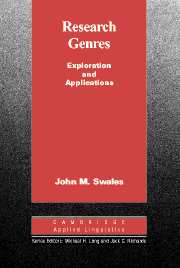Book contents
- Frontmatter
- Contents
- Series editors' preface
- Acknowledgments
- Chapter 1 Toward a world of genre
- Chapter 2 The role of English in the research world
- Chapter 3 Theoretical and methodological issues
- Chapter 4 “Getting done”: The Ph.D. dissertation
- Chapter 5 The Ph.D. defense
- Chapter 6 Research talk and research talks
- Chapter 7 The research article revisited
- Chapter 8 Three remaining issues
- Appendix
- Notes
- References
- Author index
- Subject index
Chapter 4 - “Getting done”: The Ph.D. dissertation
Published online by Cambridge University Press: 05 October 2012
- Frontmatter
- Contents
- Series editors' preface
- Acknowledgments
- Chapter 1 Toward a world of genre
- Chapter 2 The role of English in the research world
- Chapter 3 Theoretical and methodological issues
- Chapter 4 “Getting done”: The Ph.D. dissertation
- Chapter 5 The Ph.D. defense
- Chapter 6 Research talk and research talks
- Chapter 7 The research article revisited
- Chapter 8 Three remaining issues
- Appendix
- Notes
- References
- Author index
- Subject index
Summary
Introduction
This and the following chapter deal with the culminating genres of doctoral education – the Ph.D. dissertation (or thesis) and its defense (or oral examination or “viva”). Interesting questions arise about the communicative purposes or use-values (Beebee, 1994) of the two genres and thus provide another opportunity to assess the merits of the genre-repurposing proposals discussed in the previous chapter. More specifically, is it more appropriate to view these communicative events (differentially) as final elements in a chain of examination genres, or to envision them as making new contributions to human knowledge and understanding?
In this chapter, I do not give separate treatment to the “prior” genre of master's degree dissertations/theses. This decision does not at all derive from a belief that this genre is somehow not worthy of treatment in a volume devoted to real research genres; rather, it follows from a sense that, for a majority of master's students, the dissertation/thesis is the most sustained and complex piece of academic writing (in any language) they will undertake. As often as not, such students are uninterested in going on to write for publication but rather are looking forward, once having completed their fifty- to one-hundred-page documents, to entering or returning to a professional career in teaching, nursing, business, and so on. Of course, there are exceptions, since a minority do move on from a master's to a Ph.D. program, and another (though declining) minority achieve an academic, scholarly, or research career with a terminal master's, as is often the case in Sri Lanka (Mendis, personal communication).
- Type
- Chapter
- Information
- Research GenresExplorations and Applications, pp. 99 - 144Publisher: Cambridge University PressPrint publication year: 2004



